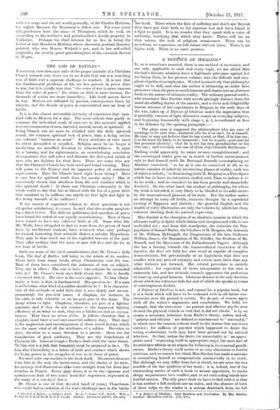THE GOD OF BATTLES.• ir HATEVER view men may take
of the proper attitude of a Christian Church towards war, there can be no doubt that war is a searching test of faith and a supremo challenge to conduct. It is not that the fundamental problems of life are less present in peace than in war, but it is vividly true that " the voice of war is more raucous than the voice of peace," the strain on faith is more intense, the demands of action are more immediate. Life itself 030,-03 faster in war. Motives are inflamed by passion, consequences bosct by tragedy, and the decade of pease is concentrated into on hour of battle.
It is in this almost unbearable intensity of experience that man- kind calls to Heaven for a sign. The same ordeals that purify or 000301110 the individual souls of mon are in like measure applied to every commission of men, material, mental, moral, or spiritual. A living Church can no more be satisfied with the daily spiritual round, the common spiritual task of pease, than a living nation can tolerate " business as usual." Every attribute of mast must be either intensified or engulfed. Religion must bo no longer a meditation, an unruffled devotion to otherworldliness. It must be a burning zeal for righteousness, an overwhelming conviction of experience that will infect and illumine the distracted minds of men who are fighting fur their lives. There are some who say that the Christian Church has been tried and found wanting. They will point to the Pommy and its apparent policy of consistent tiquivocation. Does the Church know right from wrong ? Does it care loss for spiritual truth than for secular unity ! Has it consciously chosen that aloofness from life and conduct which is also spiritual death ? Is there any Christian community in the whole world to-day that has so blazed with the fire of a groat faith that mankind in its millions can march by that light and fight in rho living warmth of its radiance ?
If the answer of organized religion to these questions is not eltogother satisfactory, it cannot be said that the secular prophets have fared bettor. Tho didactic politicians and moralists of peace have found the ordeal of war equally overwhelming. Most of them have ceased to have any coherent faith at all. Some who, like Mr. Wass have struggled to find an issue from the prison of hard facts by intellectual mudyais, have achieved what may perhaps be termed, borrowing their scientific dialect, a nebular Hypothesis. They may in time reach MO of the exploded heresies of tho past. They offer nothing that the mass of men will live and die for in the heat of battle.
Such are some of the vital considerations that Mr. Crosse's little book, The God of Battles, will bring to the minds of its readers. 'Duero have boon many books about Christianity and the war. Most of them have considered the influence of war on religion. They say in effect : The war is hero ; can religion be reconciled with it Mr. Crosse 's book says little about that. He is hardly voncerned with it. His view is the exact opposite. To him Christ- ianity is here, is first, is fundamental. His question is : If a man is a Christian, what kind of a soldier should ho be ! It is character- istic of this attitude of solid faith that it sees clearly and uncoils- promisingly the practical issues. A chaplain, for instance, in his view, is only tolerable as an integral part of the Army. The Army exists to fight. Chaplains, therefore, are part of a fighting machine, and if they do not conduce to the improved fighting efficiency of an army as such, they aro a hindrance and an encum- brance. They have no raison dere. It follows therefore that a chaplain Must have a real and essential military duty. That duty is the inspiration and encouragement of those moral factors which are the most vital of all the attributes of a soldier. Devotion to duty, devotion to a cause. devotion to a person : these are the foundations of good soldiering. They are the foundations of Christian life. General Cough's Preface deals with the same theme. To him war is a risk that humanity most he prepared to lime. To bins also ChristitZnity is a fabric of faith and conduct which shows its living power in the struggles of scar as in those of peace.
We moist refer our readers to the book itself. We cannot do more than hint at the zeal, the incisiveness, and the clarity of its style. Its message and illustrations alike come straight from the front-line trenches in France. Every page Shows it to be the vigorous and spontaneous fruit of two years' front-line experience, expressed in the essay of a ten-days' leave.
Mr. Crosse is one of that devoted band of young Churchmen who could find no solution of the war's challenge save in the battle
• The Cod of Banks : a Soldiees ?With. By E. C. Crow C.F.. D.S.O. slut a Trclacr by Desalt' Sir U. do Is F. Cough. London 1.ommuins mid Co. (Is. not.1 me itself. There where the fires of suffering and death are fiercest they have put their faith to the supremo test and have found it a light to guide. It is no wonder that they speak with a voice of authority, testifying that which they know. Theirs will be, on their return, the task of religious renaissance. There can be no reform, no expansion, no full future without them. There is no higher task. There is no surer promise,


































 Previous page
Previous page